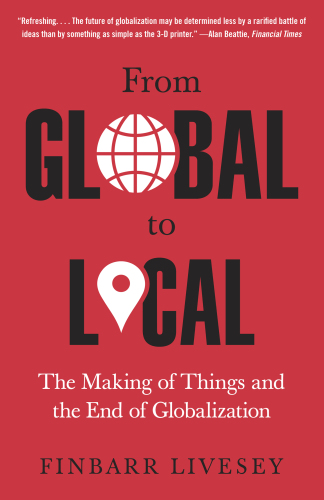
From Global to Local
The Making of Things and the End of Globalization
کتاب های مرتبط
- اطلاعات
- نقد و بررسی
- دیدگاه کاربران
نقد و بررسی

July 15, 2017
Just as Francis Fukuyama was wrong about history, this book of geopolitical wonkery has it, so all our assumptions about globalization are mistaken--and, perhaps worse, woefully out of date.What if the free trade models that hold that capital, commodities, and labor should move at will from country to country are wrong--if, that is, they proceeded from "an outmoded theory of comparative advantage"? That outmoded theory has, after all, resulted in the flow of manufacturing jobs from Oshkosh to Harbin as well as offshoring, outsourcing, multinationalizing. Livesey (Politics and International Studies/Cambridge Univ.), who notes that his own family stretches across the world's time zones, posits that there are any number of good reasons why, in the near future, economic players should question received wisdom and realign accordingly. For one thing, he writes, the near-future economy is likely to be much more highly automated than it is today, meaning that most labor will be done by machines rather than cheap workers in the developing world. The need will be for highly skilled workers to direct and service those machines, and in this regard there is no penalty for manufacturing work to stay close to home. In such a scenario, domestic markets would need to deepen. As the author points out, the in-China market for iPhones is now greater than the market for that commodity in the U.S., so it's not a stretch to see this happen, even if China "will no longer be able to depend on its role as producer to the world to continue its development." In a world of 3-D printers and robots, Livesey cautions, international trade will continue but likely with a more regional than truly global emphasis. The argument, accessible and without jargon, is more complex than the simple-minded anti-trade pact economic nationalism that has come to the fore in recent months, but it may still comfort everyone from Occupy Wall Street to the West Wing.
COPYRIGHT(2017) Kirkus Reviews, ALL RIGHTS RESERVED.

September 4, 2017
Livesey, a Cambridge lecturer on politics and international studies, puts forth the thought-provoking and disruptive premise that globalization is not the way of the future. He posits accepted wisdom on globalization’s victory as misleading and argues that, instead of being in the midst of an ever-expanding world economy, societies are operating on an economic model that became obsolete over the past few decades. As evidence that globalization is already on the decline, he cites the United States’s increased tariffs on foreign goods and current pledges to end trade deals, and the United Kingdom’s departure from the European Union. In addition, he cogently points out one downside of globalization’s ascendancy: what he calls the “hollowing out of the industrial common,” in which skills and infrastructure leave a country along with outsourced manufacturing jobs. To bring to light a positive alternative to this trend, Livesey discusses how localization in manufacturing is already taking place, with a print-on-demand machine at the Harvard Bookstore and a process currently under development at Wake Forest University for creating artificial human organs rather than relying on donations. Livesey’s insightful and reflective work makes a convincing argument that the economic landscape of the future is already being significantly reshaped.

May 1, 2017
We're so convinced that globalization is the name of the game in business, government, and culture that we haven't noticed that the world is shifting away from that model. So argues Livesey, a senior lecturer in the Department of Politics and International Studies at Cambridge, who cites increased automation, additive manufacturing, and environmental pressures among the many reasons we're going local.
Copyright 2017 Library Journal, LLC Used with permission.

























دیدگاه کاربران